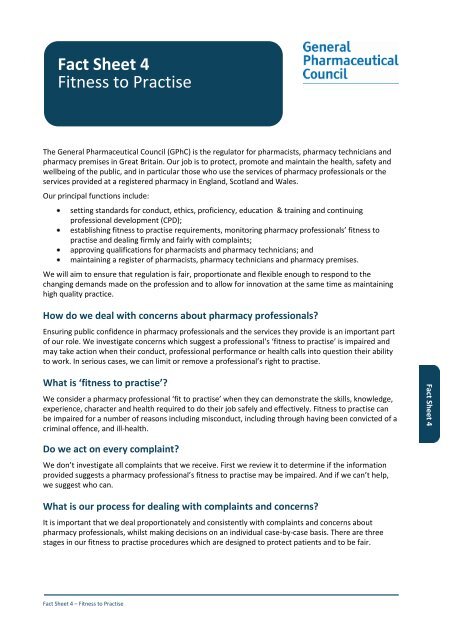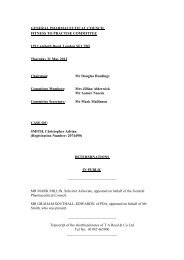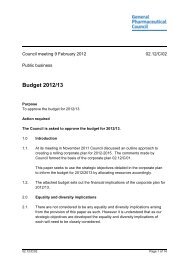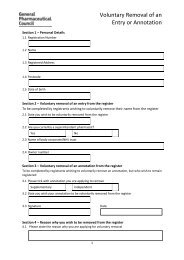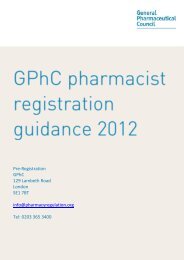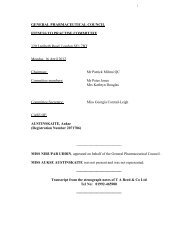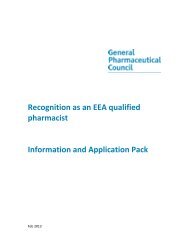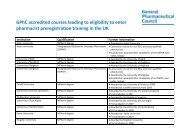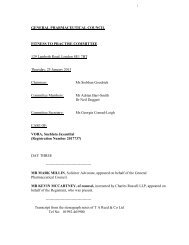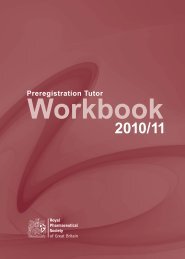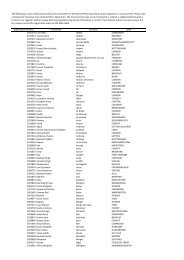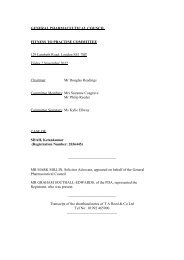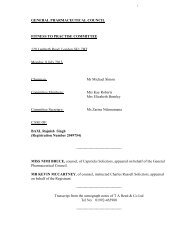FS 4 - ftp 060611 v4.pdf - General Pharmaceutical Council
FS 4 - ftp 060611 v4.pdf - General Pharmaceutical Council
FS 4 - ftp 060611 v4.pdf - General Pharmaceutical Council
You also want an ePaper? Increase the reach of your titles
YUMPU automatically turns print PDFs into web optimized ePapers that Google loves.
Fact Sheet 4<br />
Fact Sheet 4<br />
Fitness to Practise<br />
The <strong>General</strong> <strong>Pharmaceutical</strong> <strong>Council</strong> (GPhC) is the regulator for pharmacists, pharmacy technicians and<br />
pharmacy premises in Great Britain. Our job is to protect, promote and maintain the health, safety and<br />
wellbeing of the public, and in particular those who use the services of pharmacy professionals or the<br />
services provided at a registered pharmacy in England, Scotland and Wales.<br />
Our principal functions include:<br />
setting standards for conduct, ethics, proficiency, education & training and continuing<br />
professional development (CPD);<br />
establishing fitness to practise requirements, monitoring pharmacy professionals’ fitness to<br />
practise and dealing firmly and fairly with complaints;<br />
approving qualifications for pharmacists and pharmacy technicians; and<br />
maintaining a register of pharmacists, pharmacy technicians and pharmacy premises.<br />
We will aim to ensure that regulation is fair, proportionate and flexible enough to respond to the<br />
changing demands made on the profession and to allow for innovation at the same time as maintaining<br />
high quality practice.<br />
How do we deal with concerns about pharmacy professionals<br />
Ensuring public confidence in pharmacy professionals and the services they provide is an important part<br />
of our role. We investigate concerns which suggest a professional's ‘fitness to practise’ is impaired and<br />
may take action when their conduct, professional performance or health calls into question their ability<br />
to work. In serious cases, we can limit or remove a professional’s right to practise.<br />
What is ‘fitness to practise’<br />
We consider a pharmacy professional ‘fit to practise’ when they can demonstrate the skills, knowledge,<br />
experience, character and health required to do their job safely and effectively. Fitness to practise can<br />
be impaired for a number of reasons including misconduct, including through having been convicted of a<br />
criminal offence, and ill-health.<br />
Do we act on every complaint<br />
We don’t investigate all complaints that we receive. First we review it to determine if the information<br />
provided suggests a pharmacy professional’s fitness to practise may be impaired. And if we can’t help,<br />
we suggest who can.<br />
What is our process for dealing with complaints and concerns<br />
It is important that we deal proportionately and consistently with complaints and concerns about<br />
pharmacy professionals, whilst making decisions on an individual case-by-case basis. There are three<br />
stages in our fitness to practise procedures which are designed to protect patients and to be fair.<br />
Fact Sheet 4 – Fitness to Practise
Stage 1 - Investigation<br />
The way we investigate complaints (and the time it takes to do so) depends upon the seriousness and<br />
complexity of the issues raised. All evidence gathered in the course of the investigation is then reviewed<br />
and assessed against ‘threshold criteria’ which have been developed from our Standards for conduct,<br />
ethics and performance. This enables us to resolve relatively minor cases swiftly and proportionately,<br />
and refer others to the investigating committee.<br />
Stage 2 - Investigating Committee<br />
The investigating committee is essentially a screening committee made up of members of the public and<br />
registered professionals. It considers allegations and decides whether a case should be referred for a full<br />
inquiry. If it decides not to refer a case, it can accept written undertakings from the registrant or issue a<br />
warning.<br />
Stage 3 - Fitness to Practise Committee<br />
This committee, which is made up of members of the public and registered professionals and may be<br />
chaired by someone who is legally qualified, decides whether a registrant's fitness to practise is<br />
impaired and, if so, the appropriate sanction. In the interests of public accountability, fitness to practise<br />
committee hearings are open to the public, although where there are health issues in relation to fitness<br />
to practise issues these may be held in private.<br />
What happens if a pharmacy professional's fitness to practise is found to<br />
be impaired<br />
If a pharmacy professional's fitness to practise is found to be impaired, the fitness to practise<br />
committee can:<br />
Issue a warning<br />
Impose conditions on his or her practice<br />
Suspend them from practising<br />
Remove them from the register and stop them from practising<br />
We publish these decisions on our website and record them in our register. Even if we don’t find a<br />
professional’s fitness to practise impaired, we can give advice to the professional to improve their<br />
practise or another person or organisation involved.<br />
For further information<br />
If you would like further information on the GPhC you can visit www.pharmacyregulation.org<br />
Alternatively you can contact us at:<br />
Telephone: 020 3365 3400<br />
Email: info@pharmacyregulation.org<br />
17 August 2011


